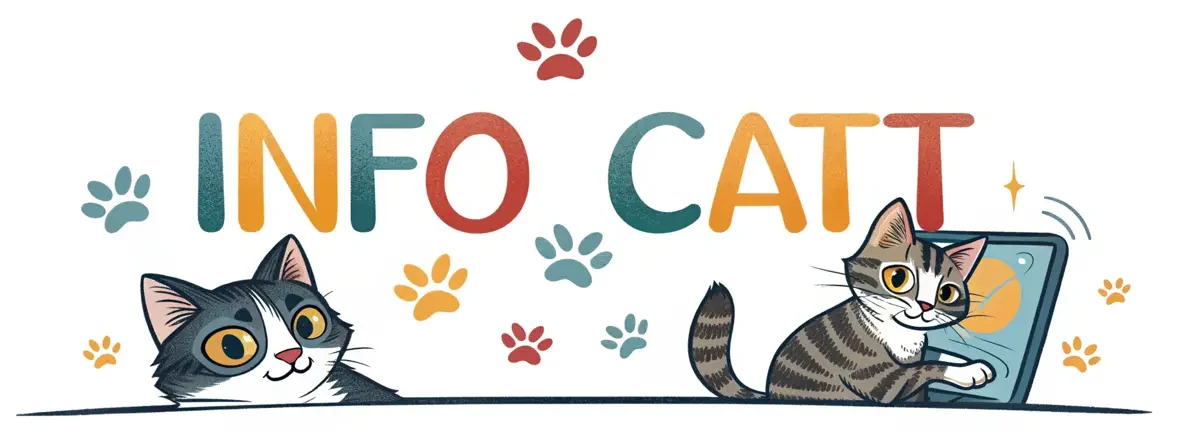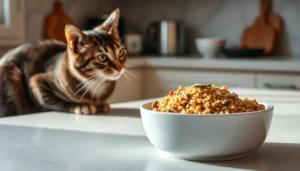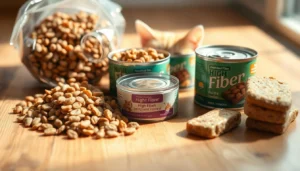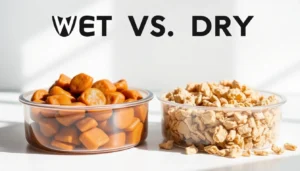Seeing your cat in pain is heartbreaking. Constipation can make them irritable and uncomfortable. It’s important to know what to feed a constipated cat to help them feel better.
Fixing cat constipation isn’t just about quick fixes. It’s about long-term nutrition that keeps your pet healthy. Whether it’s a one-time issue or a long-term problem, the right diet can greatly improve your cat’s life.
This guide will show you how to help your cat feel better through diet. We’ll cover diet changes, food choices, and natural remedies. These can greatly improve your cat’s digestive health.
Understanding Cat Constipation : Signs and Symptoms
Knowing the signs of constipation in cats is key to quick action. Cats often hide their discomfort. So, it’s important for owners to watch their cat’s bathroom habits closely.
Common Signs Your Cat Is Constipated
Look out for these signs that your cat might be constipated:
- Straining in the litter box with little or no results
- Decreased frequency of bowel movements
- Hard, dry stools
- Visible discomfort during attempts to defecate
- Reduced appetite
- Lethargy or unusual quietness
How Long Can a Cat Safely Go Without Pooping
Vets say to worry if your cat hasn’t pooped in 48-72 hours. Going too long without a bowel movement can mean serious health issues.
Risk Factors for Feline Constipation
Several things can lead to cat constipation:
- Dehydration
- Low-fiber diet
- Lack of exercise
- Underlying medical conditions
- Age-related digestive changes
- Stress or environmental changes
If your cat shows signs of constipation, see a vet. They can check for serious health problems and help with treatment.
What to Feed a Constipated Cat : Essential Diet Changes
When your cat has constipation, diet is very important. The right food can greatly improve their digestive health. Making smart nutritional choices is key to helping your cat.
Keeping your cat hydrated is crucial. Switching to wet food can really help their digestive system. Wet food has more moisture than dry food, which helps your cat pass stool easier.
- Increase water intake by offering multiple water sources
- Mix wet food with dry kibble to boost moisture
- Consider bone broth or water-rich food toppers
Your vet might suggest special diets for your cat. Soft, easily digestible foods can help with constipation. Look for foods with lots of moisture and moderate fiber for better digestion.
Proper nutrition is the first line of defense against feline constipation.
Some cats need special diets for their digestive issues. These diets can help control bowel movements and give your cat the nutrients they need for good health.
High-Fiber Foods That Help Relieve Cat Constipation
Dealing with a constipated cat can be tough. But, changing their diet can help a lot. Adding high fiber food to their meals can improve their digestion and ease blockages.
Vets suggest several natural and commercial fiber supplements for cats. These can greatly benefit your cat’s digestive system.
Natural Fiber Sources Safe for Cats
Trying homemade food for constipated cats can be a good idea. Here are some safe natural fiber sources:
- Pumpkin puree (plain, unsweetened)
- Steamed green beans
- Pureed squash
- Small amounts of cooked sweet potato
Commercial High-Fiber Cat Food Options
Many cat food brands offer high-fiber formulas for digestive health. Look for:
- Natural fiber sources
- Vet-recommended products
- Options that meet your cat’s nutritional needs
Proper Fiber Portions and Feeding Schedule
Begin with small amounts of fiber supplements and slowly add more. Typically, 1-2 teaspoons of pumpkin puree or a sprinkle of fiber supplement can help improve your cat’s digestive regularity.
“Always consult with your veterinarian before making significant dietary changes for your cat.” – Veterinary Nutrition Experts
Remember, every cat is different. What works for one might not work for another. Watching how your cat reacts to diet changes is key to keeping them healthy and comfortable.
Wet Food vs . Dry Food : Making the Right Choice
Choosing the right food is key when your cat has constipation. It’s important to know the good and bad of wet and dry food for your cat’s health.
Wet food is often the best choice for constipation. It has a lot of moisture, which helps keep your cat hydrated. This is crucial for avoiding digestive problems. Here’s why wet food is good for constipated cats:
- Increased hydration
- Easier digestion
- Higher water content
- Softer texture
Don’t write off dry food just yet. It has its own perks, like helping with dental health and being easy to store. The goal is to find a mix that suits your cat’s needs.
Here are some tips for managing your cat’s diet:
- Mix wet and dry food gradually
- Ensure constant access to fresh water
- Choose high-fiber options
- Consult with your veterinarian
Pro tip: Changing your cat’s diet for better digestion takes time. Be patient and watch your cat closely as you make these changes.
Remember, every cat is unique. What works for one might not work for another.
Natural Remedies and Supplements for Cat Constipation
When your cat has trouble with constipation, natural remedies can offer gentle relief. Knowing safe ways to help can support your cat’s digestive health without stress.
Looking into natural remedies for cat constipation needs careful thought and vet advice. Simple home solutions can greatly improve your cat’s digestive comfort.
👉 Safe Human Foods That Can Help
Certain human foods can act as natural stool softeners for cats when given in small amounts:
- Pumpkin puree: Rich in fiber and moisture
- Small amounts of olive oil: Helps lubricate the digestive tract
- Plain canned sardines: Provides omega-3 fatty acids
👉 Veterinary-Approved Supplements
Experts suggest specific supplements for constipated cats. These targeted solutions support digestive health:
- Psyllium husk powder: Natural fiber supplement
- Probiotics: Supports gut microbiome balance
- Enzyme supplements: Aids digestion
👉 Mixing Methods and Portions
Start with small amounts when introducing new remedies. Consult your veterinarian to determine the right dosage for your cat. Slow introduction prevents upset and lets you watch your cat’s reaction.
Remember, while natural remedies can help, ongoing constipation needs vet care. Your cat’s health and comfort are always most important.
Conclusion
Managing cat constipation starts with a focus on your cat’s diet and health. By making dietary changes, ensuring they drink enough water, and using natural remedies, you can help their digestive system stay healthy. It’s important to feed them high-fiber foods, keep them hydrated, and watch their bathroom habits closely.
When looking for remedies for cat constipation, remember that every cat is different. What works for one might not work for another. Watch how your cat reacts to different foods and be ready to make changes. If your cat’s symptoms don’t get better or get worse, it’s time to see a vet.
Keeping your cat’s digestive health in check is more than just quick fixes. Regularly check on their health, feed them well, and watch for any changes in their bathroom habits. Trust your gut and talk to a vet if you’re worried about your cat’s digestive system.
The best way to fight feline constipation is with the right food, enough water, and vet care. Stay up to date, watch your cat closely, and be proactive in keeping them healthy.
FAQ
How long can a cat go safely without pooping?
Cats usually poop every 24-48 hours. If it’s been more than 48-72 hours, they might be constipated. You should talk to your vet. Waiting too long can cause serious health problems.
What are the signs of constipation in cats?
Look for signs like straining in the litter box and small, hard stools. They might also eat less, vomit, or seem uncomfortable. If they’re not pooping as often, or seem tired, it’s a sign too.
What foods can help relieve cat constipation?
Wet food is great because it’s moist. Pumpkin puree can add fiber. A little olive oil or canned sardines in water might help too. But, always check with your vet before changing their diet.
Can I give my cat human food to help with constipation?
Some human foods can help, but be careful. Pumpkin puree, olive oil, and bone broth are okay. But, avoid dairy because many cats can’t digest it. Start with small amounts and watch for any bad reactions.
When should I see a vet about my cat’s constipation?
Call your vet if constipation lasts more than 48-72 hours. If your cat is in pain, won’t eat, or shows other symptoms like vomiting or tiredness, it’s time to go. Chronic constipation can mean there’s a bigger health issue.
Is dry food bad for cats with constipation?
Dry food can make constipation worse because it’s dry. If your cat has trouble pooping, try wet food or add water to their dry food. Make sure they always have fresh water to stay hydrated.
Are there any natural supplements that can help with cat constipation?
Yes, vet-approved supplements like psyllium husk, probiotics, and fish oil can help. Pumpkin powder is also good. But, always talk to your vet before starting any new supplements to make sure they’re safe for your cat.
How can I prevent future constipation in my cat?
Feed them a diet rich in moisture and make sure they drink plenty of water. Encourage exercise, manage their weight, and add fiber if needed. Regular vet visits can catch and prevent digestive problems early.



